|
|
|
Sort Order |
|
|
|
Items / Page
|
|
|
|
|
|
|
| Srl | Item |
| 1 |
ID:
129442
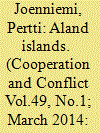

|
|
|
|
|
| Publication |
2014.
|
| Summary/Abstract |
The Åland Islands received their co-sovereign standing from the League of Nations in 1921, the settlement of a Finnish-Swedish dispute. The clash was over ownership, and the league advocated that Åland should remain part of Finland, albeit elevated to the status of a self-governing polity. The verdict implied that Finland's sovereignty was significantly compromised, whereas the islands landed in an in-between situation, being neither local nor fully sovereign. The duality of Åland - remaining an integral part of Finland yet still distinct with a standing of its own, including various cultural and linguistic safeguards - meant more generally that the islands fall through the interstices of the dominant discourses pertaining to political space. However, the lack of any clear conceptual standing has not amounted to anything profoundly disadvantageous. Their liminal nature of being neither this nor that has instead furnished the islands with a rather favourable posture. Their standing, although initially perceived as a loss and still seen in some interventions as unwarranted and viewed as a source of ontological uncertainty, arguably accounts for their ability to transform what usually appears as weakness into a considerable degree of influence. The article thus aims to explore what explains such an outcome and the manner in which the ambiguity of the islands has stood the test of time, taking into account that their standing has, among other things, been impacted by Finland and the islands both joining the EU in 1995 and the sovereignty games involved.
|
|
|
|
|
|
|
|
|
|
|
|
|
|
|
|
| 2 |
ID:
129441
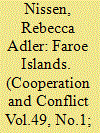

|
|
|
|
|
| Publication |
2014.
|
| Summary/Abstract |
This article examines the intersection of postimperial sovereignty and European integration in the context of a disintegrating Nordic empire. More specifically, it explores the relationships between the Faroe Islands - a group of self-governing islands in the North Atlantic - Denmark and the rest of the world. While the Faroe Islands have gained increased autonomy from Denmark, Faroese separatists are now discussing whether to transfer their newly won autonomy further on to the EU. This contradictory development of separation and integration is shaped by interweaving ideas of sovereignty, nationalism, globalization and postcolonial dependency. The article shows that the Faroese-Danish relationship is being internationalized and Europeanized as the EU and UN become reference points in negotiations of political visions for an independent Faroese state and the controversial issue of pilot whaling. Notwithstanding Dramatic Transformations, the Faroese-Danish relationship has maintained its postcolonial character, where Denmark is awkwardly constituted as a maternalistic colonial power defending an adolescent colonized from the rest of the world. The real novelty is not the increased Faroese autonomy from Denmark, but how the EU challenges the unity of the postimperial Danish realm and hence the myth of a homogenous Danish nation-state.
|
|
|
|
|
|
|
|
|
|
|
|
|
|
|
|
| 3 |
ID:
129443
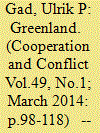

|
|
|
|
|
| Publication |
2014.
|
| Summary/Abstract |
The relationship between Greenland and the European Union (EU) can best be understood by exploring the development from Danish colonialism to a future independent Greenlandic state. In 1985, Greenland became the first territory ever to leave the European Economic Community (EEC) when it opted for status as an 'overseas country or territory'. The manner in which Greenland had to follow Denmark into the EEC in 1973 - whereby Greenlanders saw control over their fisheries move from distant Copenhagen to even-more-distant Brussels - was pivotal for the Greenlandic demands for home rule that succeeded in 1979 and made the 1985 withdrawal possible. On 25 November 2008, a majority of the people of Greenland voted in favour of enhanced home rule - 'self-government' - still within formal Danish sovereignty. Denmark and Greenland alike are preparing for a future envisioned as involving climate change, intensive raw material extraction, new transportation corridors and new claims to sovereignty over the Arctic. Greenland uses this imagined future as a way of enhancing its subjectivity, not the least when dealing with the EU. This article analyses how the Greenlandic self-understanding as being on the way to sovereignty - and the tensions involved - structures the triangular relationship between the EU, Greenland and Denmark. The article concludes that the visions of sovereign equality might, on the one hand, create greater expectations than Greenland will immediately be able to live up to - at home and in the EU. On the other hand, the representation of the Greenland-EU relationship as one of sovereign equality - present and future - might just be able to provoke the resources necessary to make the dream come true.
|
|
|
|
|
|
|
|
|
|
|
|
|
|
|
|
| 4 |
ID:
129440
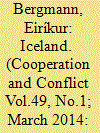

|
|
|
|
|
| Publication |
2014.
|
| Summary/Abstract |
The historical links with imperial Denmark still have an impact on Iceland's foreign policy and its approach to Europe in particular. This article examines the triangular relationship between Iceland, its former colonizers (Norway and Denmark) and the European Union (EU). Iceland's political identity was carved out in the course of its independence struggle from Denmark (1830-1944), based on a fundamental belief in its formal sovereignty, which still dictates Icelandic foreign relations to a great extent. In order to uphold the standard of being considered a modern Nordic welfare state, however, Iceland has an economic need to participate in the EU's internal market, resulting in the European Economic Area agreement. Iceland's postimperial sovereignty games are mostly played within these boundaries. To understand its position within the European project, this paper analyses how, until the economic 'Crash of 2008', the national identity emerging out of the colonial experience has limited Iceland's relationship with the EU.
|
|
|
|
|
|
|
|
|
|
|
|
|
|
|
|
| 5 |
ID:
129444
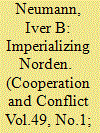

|
|
|
|
|
| Publication |
2014.
|
| Summary/Abstract |
The two pre-Napoleonic Nordic polities are best understood as empires. Drawing on recent analytical and historical scholarship on empires, I argue that 17th and 18th century Denmark, on which the piece concentrates, was very much akin to the other European empires existing at the time. Read in this light, national identities within the fragments of the empire appear similar. Nationalisms are all shaped directly on the Danish model, having at the same time Denmark as their constitutive cultural other. The introduction notes that, where all European imperial experiences are concerned, overseas territories had the most wounds inflicted upon them. We would not know this if we considered Faroese, Icelandic and Norwegian nationalism in isolation. These polities, Norway in particular, participated in and benefited from the colonial policies of the empire. This notwithstanding, their national identities insist that these nations were on the receiving - as opposed to the imposing - end of imperialism. This is a historically unwarranted and ethically problematic stance requiring further discussion.
|
|
|
|
|
|
|
|
|
|
|
|
|
|
|
|
| 6 |
ID:
129445
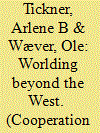

|
|
|
|
|
| Publication |
2014.
|
| Summary/Abstract |
Post-colonial scholarship, with its origins in studies of the long-term literary and more generally cultural effects of nineteenth-century European imperialism, made a relatively late entry into International Relations (IR). By 2007, though, post-colonialism was considered sufficiently important to be covered in an introductory textbook on International Relations Theories (Grovogui, 2007), and in recent years post-colonial approaches have made themselves felt in a number of reformulations of the tasks and future of the discipline (for example Agathangelou and Ling, 2009; Chan, 2010; Nayak and Selbin, 2010; Shilliam, 2011). Self-reflexive studies of the history and sociology of IR as a knowledgeproducing academic practice, or what Henrik Breitenbauch brackets together as 'meta- IR', have a rather longer history but received a boost in the late 1990s with the appearance of some major contributions that continue to shape debates in the field (see Hoffmann, 1977 for the influential and much-cited argument that IR has been an 'American social science', and subsequently Schmidt, 1998; Wæver, 1998).
|
|
|
|
|
|
|
|
|
|
|
|
|
|
|
|
|
|
|
|
|